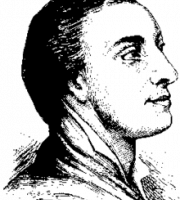About Mark Akenside
Mark Akenside (9 November 1721 in Newcastle upon Tyne – 23 June 1770 in London) was an English poet, physician, and author of a number of medical works. He first studied theology, but he soon abandoned it for medicine. He practiced successively in Northampton, Hampstead and London, and became a Fellow of the Royal Society and the Royal College of Physicians. While practicing his art, he successfully began to write poetry. The work that made his reputation is the poem The Pleasures of the Imagination (1744), written in blank verse. He composed it at the age of 23 after a stay in Morpeth in 1738, where he had the idea to write a didactic poem, which he retouched several times throughout his life. The poem does have a very sonorous rhyme, but in general, it shows more of his philosophical way of thinking than the presence of real poetic talent. When Akenside first submitted his poem to the publisher Robert Dodsley (1704–1764), the latter consulted his poet friend and translator Alexander Pope to assess the literary merit of the work. He is said to have affirmed that Akenside was not an everyday writer. Another remarkable text was his Hymn to the Naiads. Akenside also left some esteemed dissertations on medicine. His poetic works were collected in London in 1772. Akenside's poetry was better when it was subjected to more severe metrical rules before he adopted the ode as his favorite poetic form. However, his odes were rarely lyrical in the strict sense, but they were dignified and often musical. By 1911, his works were little read. Akenside died at his home in Burlington Street, London, where he had lived for the past ten years.Browse all poems and texts published on Mark Akenside
Edmund Gosse described him as "a sort of frozen Keats".









